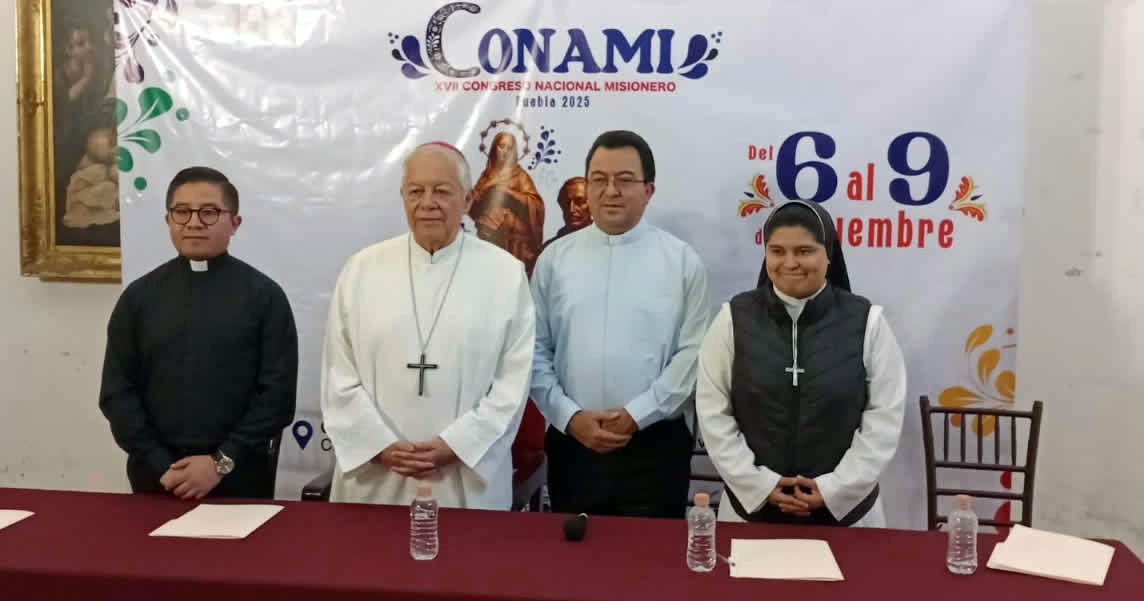Joaquim Magalhães de Castro
In a moving message addressed to the bishops, priests, religious men and women, and lay people gathered in Puebla de los Ángeles for the XVII National Missionary Congress of Mexico (Congreso Nacional Misionero, XVII CONAMI), Pope Leo XIV recalled that the true missionary shares “the faith as one shares bread.” Christ himself attracts him and calls him to “put his hand in the dough of history,” so that faith, like leaven, may act “in the history and culture of the people, transforming them from within.”
At the beginning of his message, the Pope said: “Your massive presence at this important event fills me with joy. But I am even more moved to recognize in you the generosity with which you support the missionary work of the Church through persistent prayer, sacrifices, and the spiritual and material support you offer.”
To illustrate the unique and unparalleled dynamic that characterizes the missionary work of the Church, Pope Leo XIII drew inspiration from the domestic image used by Jesus in the parable of the leaven in the Gospel according to Matthew, where the Son of God says that “the kingdom of heaven is like leaven that a woman took and mixed with three measures of flour, until the whole lump was leavened” (Mt 13:33).
The leaven to which Jesus refers, said the Bishop of Rome, “was different from the dry or industrial leavens used today in baking. At that time, small pieces of dough from previous days, already leavened, were kept and, when mixed with fresh flour and water, caused the whole lump to ferment.”
“St. Jerome,” the Pontiff continued, in his commentary on the Gospel of Matthew, “identified the woman in the parable with the Church itself, which, with patience, is able to integrate faith into the history and culture of the people, so as to transform them from within.” Saint John Chrysostom comments that “leaven, when buried, is not destroyed, but transforms everything in its own condition.”
Even in Mexico – the Successor of Peter reminded his Mexican interlocutors – the salvation brought by Jesus reached individuals, groups, and peoples according to the dynamic suggested by Christ himself in his parables. Thus, “the leaven of the Gospel reached the hands of some missionaries. They were the hands of the Church, which began to knead the leaven they had brought with them – the repository of faith – with the new flour of a continent that did not yet know the name of Christ.”
Thus, “the slow and admirable process of fermentation began. The Gospel did not erase what it found but transformed it. All the incredible richness of the inhabitants of those lands – languages, symbols, customs, and hopes – was kneaded with faith, until the Gospel took root in their hearts and blossomed into works of singular holiness and beauty.”
The Augustinian Pope recalled that, even in Mexico, “the first evangelizers – diocesan, Franciscan, Dominican, Augustinian and Jesuit – faithfully undertook the task of doing what Christ commanded. Wherever they preached, faith flourished and, with it, culture, education and charity. Thus, little by little, the dough continued to ferment and the Gospel became bread capable of satisfying the deepest hunger of the people.”
Addressing the participants of the Congress taking place in Puebla, the Pontiff wanted to recall, in particular, the figure of Blessed Juan de Palafox y Mendoza, a pastor and missionary who understood his ministry as service and leaven. “I remember well,” he added, “when I visited Puebla as Prior General of the Augustinians, how the figure of the Blessed remained alive in the memory of the people of Puebla.” And his story continues to challenge “the pastors of today, for it teaches that to govern is to serve” and that “all authority, when exercised according to the criteria of Christ, becomes a source of communion and hope.”
“The true missionary,” insisted Pope Leo XIII, referring to the writings of the Mexican Blessed, “does not dominate, but loves; does not impose, but serves; and does not exploit faith for personal gain—whether material, of power, or of prestige—but distributes faith like bread.”
Our time, continued Pope Prévost, presents itself to us as a millstone “in which the pains of poverty, social divisions, the challenges of new technologies, and sincere desires for peace continue to be ground into new flour that risks being leavened with bad yeast.” Therefore, he added, the Lord Jesus also calls the missionaries of today “to be the hands of the Church that place the leaven of the Risen One in the dough of history, so that hope may be reborn.”
It is not enough to exclaim “Lord, Lord,” the Pontiff clarified, quoting other words from the Gospel according to Matthew. Instead, we should “be willing to plunge our hands into the dough of the world.” It is not enough to speak “of flour without getting our hands dirty”; it is necessary, rather, to “touch it,” as Chrysostom said, “to mix it, to let the Gospel merge with our lives until it transforms them from within.” Thus, the Kingdom will grow, not by force or numbers, but by the patience of those who, with faith and love, continue to knead together with God.
At the end of his message, Leo XIV gave his blessing to the participants of the National Missionary Congress, assuring them of “my prayers and closeness” and asking everyone to continue “working faithfully, until ‘the whole lump is leavened’”.


 Follow
Follow


